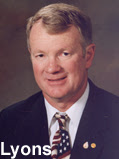 New Mexico Land Commissioner Pat Lyons is the latest politician to unwittingly make the case for placing limits on campaign contributions.
New Mexico Land Commissioner Pat Lyons is the latest politician to unwittingly make the case for placing limits on campaign contributions.
The PAC is run by Republican lobbyist David Kimble and Democratic lobbyist Domonic Silva. Kimble is a lobbyist for Philippou, furthering the appearance of an inside deal.
That’s because, only a few weeks after the money changed hands,
Lyons, who doesn’t have to seek bids before awarding such contracts, chose to seek bids for the state land; then, a little more than a month before proposals were due, he signed the contracts with Philippou and circumvented his own bidding process.
He did it right after Christmas, upping the suspicion level even more. No one was watching that week.
That’s why Philippou should not have been allowed to give so much money to the PAC, and the PAC should not have been allowed to give so much money to
Limits would greatly reduce the appearance of impropriety in this situation.
Anyone who takes large contributions is suspect
This year, the House approved limits on contributions to individual candidates. A number of senators argued that, to be fair, the limits should also apply to contributions to political action committees. The
The Senate approved limits on contributions to individuals and PACs. The House, whose speaker uses the well-funded Democratic Legislative Campaign Committee to hold on to his power, refused to concur, and the bill died. If the House had approved the Senate amendment, the DLCC would have lost much of its influence.
The Republican Lyons isn’t the first to prove the need for limits. Massive contributions from individuals and PACs have earned Democratic Gov. Bill Richardson a lot of criticism.
The problem touches politicians in both parties. It doesn’t matter who you are. If you’ve ever taken a sizable contribution from any person or group, you’re suspect. It’s a consequence of the current system.
That includes a number of Democratic House members – including Andy Nuñez, Jeff Steinborn and Nate Cote – who each took tens of thousands of dollars last year from the DLCC. It includes Republican Reps. Candy Spence Ezzell, who took $5,000 from Yates Petroleum, and Shirley Tyler, who took $8,400 from the state Republican Party.
It includes Lyons, who also took $35,000 from Forest City Covington, another developer building a massive project in
The problem is systemic
I’m not trying to single anyone out. In fact, I think most of the politicians I just named are ethical. But, though most politicians place the interests of
The few who have abused the system are making everyone look bad.
Still, it’s hard to blame any politician for taking a lot of money, as long as it’s legal. If they don’t, they might not have the funds to compete, because their opponent probably will.
Of course
The problem is far greater than any individual politician. It’s systemic, and it will likely take additional pressure from citizens to change the system. House Democrats easily approved limits on contributions to individuals this year, but their refusal to place similar limits on gifts to PACs indicates that their approval was disingenuous.
The Senate, which was generally resistant of ethics reform in the last session, was right on this one: Campaign contributions to individuals and PACs must be limited. We have a bipartisan group of examples that prove the need to change the law.
